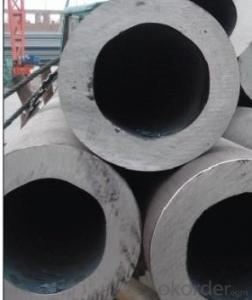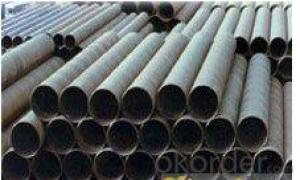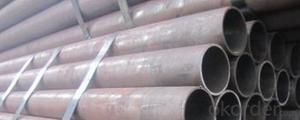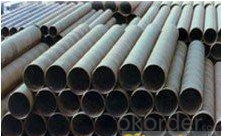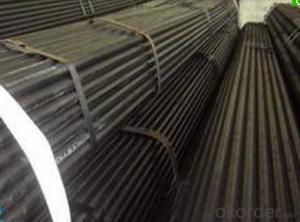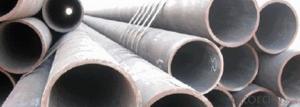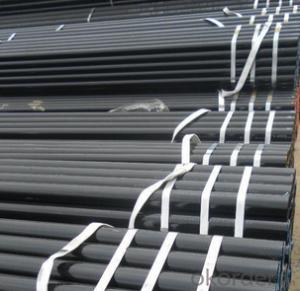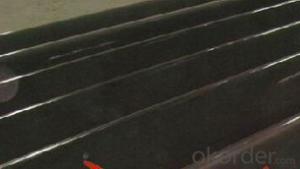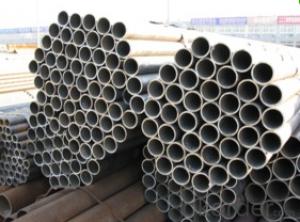Schedule 40 Seamless Carbon Steel Pipe ST37 CNBM
- Loading Port:
- Qingdao
- Payment Terms:
- TT OR LC
- Min Order Qty:
- 10 pc
- Supply Capability:
- 30 pc/month
OKorder Service Pledge
OKorder Financial Service
You Might Also Like
Quick Details
| Thickness: | 1.73 - 59.54 mm | Section Shape: | Round | Outer Diameter: | 10.3 - 914.4 mm |
| Secondary Or Not: | Non-secondary | Application: | Fluid Pipe | ||
| Technique: | Hot Rolled | Certification: | API | Surface Treatment: | Galvanized,vanish covering, black painting, galvenized ect. |
| Special Pipe: | API Pipe | Alloy Or Not: | Non-alloy | Length: | 5-12m as per customer's requirements |
| SCH: | SCH10~160, STD, XS & XXS | Payment Terms: | L/C T/T | Supply Ability: | 5000 Ton/Tons per Week |
| Product: | pipe prices | Grade: | 10#,20#,45#,A106(B,C),A53(A,B),12Cr1MoV,12Cr1MoVG,12Cr2Mo,13CrMo44,13CrMo45,15CrMo,15CrMoG,St52,St52.4,10#-45#,A53-A369,Cr-Mo alloy,ST35-ST52 | Standard: | API 5CT,API 5L,ASTM A106-2006,ASTM A53-2007,DIN 17175,GB 3087-1999,GB 5130,GB 6479-2000,GB 9948-2006,GB/T 17396-1998,GB/T 5312-1999,GB/T 8162-1999,GB/T 8163-1999,API,ASTM,DIN,GB |
Packaging & Delivery
| Packaging Detail: | By bundles, seaworthy wooden cases, steel framed cases, and simple packaging or according to the demand of the customers. |
| Delivery Detail: | within 5-15 days |
Specifications
1.pipe prices
2.Supply Ability:5000 Tons per Week
3.Payment Terms:L/C T/T
High quality Carbon steel pipe, Best pipe prices
1) Application: Overheat pipe for low and mediumpressure boiler,boiling water pipe, locomotive smoke pipe(big and small),Carry gas ,water or oil in the industries of petroleum and natural gas etc
2) Materials: 10#, 20#, 45#, 15CrMo, 12Cr1MoV, 13CrMo44, 12Cr2Mo, 13CrMo45, 12Cr1MoVG, 15CrMoG, API J55, API K55, API N80, API L80, API P110
3)Pipe according to standard: GB 3087-1999, GB/T 8163-1999, GB/T 8162-1999, GB 9948-2006, GB/T 17396-1998, GB/T 5312-1999, GB 6479-2000, GB 5130, DIN 17175, API 5CT, API 5L .
4)Packing: By bundles, seaworthy wooden cases, steel framed cases, and simple packaging or according to the demand of the customers.
Technical Parameters of Seamless Steel Pipe
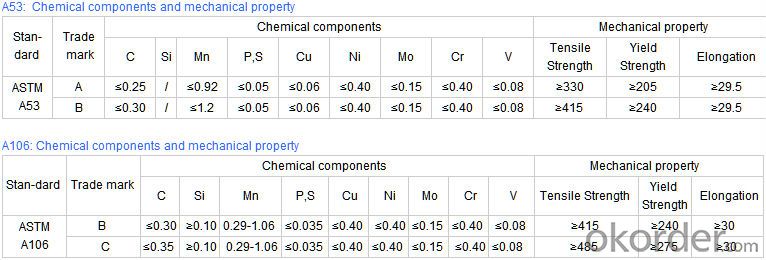
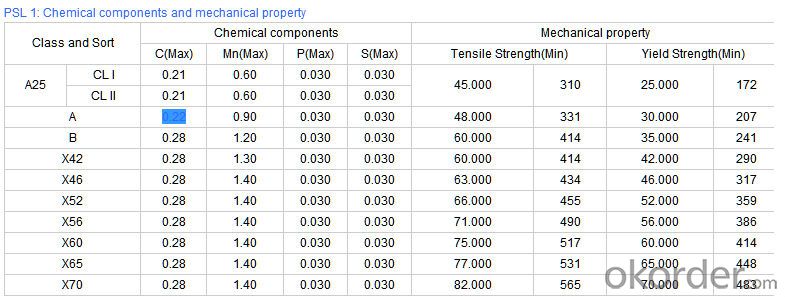
- Q: When can I use the PVC pipe and when to use the galvanized pipe?
- PVC pipeline use temperature is -5 to 90 degrees or so, according to the current market price of around 6000 yuan per ton, the price is cheap. Its corrosion resistance is good, can resist most of the acid and alkali, and unlike the steel pipe that is easy to rust, so in the construction of the upper and lower water pipes and other fields have gradually replaced the trend of steel pipe.
- Q: How do steel pipes handle extreme temperatures?
- Steel pipes are highly durable and can handle extreme temperatures due to their inherent strength and heat resistance. They have a high melting point, allowing them to withstand both very high and very low temperatures without compromising their structural integrity. Additionally, steel pipes have excellent thermal conductivity, which enables them to efficiently transfer heat and prevent damage caused by extreme temperature fluctuations.
- Q: What are the different shapes available for steel pipes?
- There are several different shapes available for steel pipes, including round, square, rectangular, and oval shapes.
- Q: How are steel pipes used in the aerospace industry?
- Steel pipes are widely used in the aerospace industry for various applications. One of the primary uses of steel pipes in aerospace is for the construction of aircraft frames, where they provide the necessary strength and structural integrity. Steel pipes are often used in the fuselage, wings, and landing gear of airplanes, as well as in rocket launch vehicles and space shuttles. Steel pipes are favored in the aerospace industry due to their exceptional strength-to-weight ratio. They are lightweight yet incredibly strong, allowing for the construction of durable and reliable aerospace structures. This is particularly crucial in the aerospace industry, where weight reduction is a significant concern to enhance fuel efficiency and overall performance. Additionally, steel pipes are also utilized for the transportation of fluids and gases within aircraft systems. They are commonly used in the aircraft's hydraulic and fuel systems, carrying crucial fluids such as hydraulic fluid, fuel, and coolant. Steel pipes ensure the safe and efficient flow of these fluids throughout the aircraft, contributing to its proper functioning and performance. Furthermore, steel pipes are employed in the aerospace industry for heat transfer purposes. They are used as part of the aircraft's cooling systems, helping to dissipate heat generated by engines, electrical components, and other systems. Steel pipes are known for their excellent thermal conductivity, making them an ideal choice for transferring heat away from critical areas and preventing overheating. In summary, steel pipes play a vital role in the aerospace industry. They are used in aircraft construction for their strength and structural integrity, as well as for fluid and gas transportation and heat transfer. The use of steel pipes in the aerospace industry ensures the safety, efficiency, and reliability of aerospace structures and systems.
- Q: What is the difference between internal coating and external lining of steel pipes?
- Internal coating and external lining are two different methods used to protect steel pipes from corrosion and other forms of damage. Internal coating refers to the process of applying a protective layer or coating to the inner surface of the steel pipe. This is done to prevent the pipe from corroding or being damaged by the fluid or substance being transported through it. The coating is typically made of materials such as epoxy, polyurethane, or polyethylene, which provide a barrier between the pipe and the transported material. Internal coating helps to extend the lifespan of the pipe and maintain the quality of the transported material. On the other hand, external lining refers to the process of applying a protective layer or lining to the outer surface of the steel pipe. This is done to protect the pipe from external factors such as soil, moisture, chemicals, or physical damage. The external lining is usually made of materials such as polyethylene, polypropylene, or fusion-bonded epoxy. The lining acts as a barrier, preventing corrosive substances from coming into contact with the pipe and causing damage. It also helps to maintain the structural integrity of the pipe and prevent any leaks or cracks from forming. In summary, the main difference between internal coating and external lining of steel pipes is the location of the protective layer. Internal coating is applied to the inner surface of the pipe, while external lining is applied to the outer surface. Both methods aim to protect the pipe from corrosion and damage, but they focus on different aspects of pipe protection.
- Q: What is the meaning of "DN" and "Phi" in the dimensioning of steel pipe diameter and how to apply the mark?
- DN refers to the nominal diameter of the pipe, but this is neither the outside diameter nor the inside diameter, and the "Phi" means the outer diameter of the steel pipe. For example, the same nominal diameter of the steel pipe due to its different wall thickness, corresponding to the outer diameter is also different. As can be seen from the chart below:Project control table (commonly used) diameter pressure pipe standard pressure pipe standard pressure pipe standard specification DN- nominal diameter: diameter of large diameter series DN15- 22mm DN20- 27mm DN25- phi, Phi Phi Phi Phi 34mm, DN32- 42mm DN40- 48mm DN50- 60mm DN65-, Phi Phi 76 (73) mm, DN80- 89mm DN100- 114mm DN125- and Phi Phi Phi. 140mm DN150- 168mm DN200- 219mm DN250- phi, Phi Phi Phi Phi 273mm, DN300- 324mm DN350- 360mm DN400- 406mm DN450- 457mm DN500- and Phi Phi Phi Phi, 508mm DN600- 610mm, DN15- 18mm series of small diameter Phi Phi Phi, DN20- 25mm DN25- 32mm DN32- 38mm DN40- 45mm DN50- Phi Phi, Phi Phi Phi 57mm DN65- 73mm, DN80- 89mm DN100- 108mm, DN125- 133mm DN150- 159mm DN200- and Phi Phi Phi Phi, 219mm DN250- 273mm DN300- 325mm DN350- 377mm, Phi phi,
- Q: Are steel pipes suitable for fire protection systems?
- Yes, steel pipes are suitable for fire protection systems. They are widely used due to their durability, strength, and resistance to high temperatures. Steel pipes can efficiently transport water or fire suppressants to extinguish fires effectively, making them a reliable choice for fire protection installations in various buildings and industrial settings.
- Q: How do steel pipes handle water hammer?
- Steel pipes handle water hammer by absorbing and dissipating the energy caused by sudden changes in water flow or pressure. The strong and rigid nature of steel pipes allows them to withstand the impact of water hammer without deforming or breaking. Additionally, the smooth interior surface of steel pipes minimizes turbulence and reduces the likelihood of water hammer occurring.
- Q: Can steel pipes be used for LNG terminals?
- Yes, steel pipes can be used for LNG terminals. Steel pipes are commonly used in LNG terminals for transporting and distributing liquefied natural gas due to their strength, durability, and ability to withstand extreme temperatures and pressures. Additionally, steel pipes can be easily welded and have excellent corrosion resistance, making them suitable for the transportation and storage of LNG.
- Q: What is the maximum operating temperature for steel pipes?
- The specific grade of steel used typically determines the maximum operating temperature for steel pipes. Carbon steel pipes, for instance, can generally endure temperatures ranging from 800-1000 degrees Fahrenheit (427-538 degrees Celsius). On the other hand, stainless steel or high-temperature alloys can withstand even higher temperatures, exceeding 1200-1500 degrees Fahrenheit (649-816 degrees Celsius). To determine the precise maximum operating temperature for a particular type of steel pipe, it is crucial to refer to the manufacturer's specifications or industry standards. This is because varying grades and compositions may have distinct temperature limits.
Send your message to us
Schedule 40 Seamless Carbon Steel Pipe ST37 CNBM
- Loading Port:
- Qingdao
- Payment Terms:
- TT OR LC
- Min Order Qty:
- 10 pc
- Supply Capability:
- 30 pc/month
OKorder Service Pledge
OKorder Financial Service
Similar products
Hot products
Hot Searches
Related keywords
